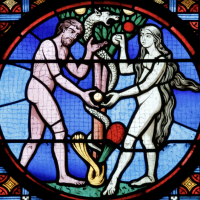Biblical Studies Courses
Reviled and Revered:
Serpents and Dragons in the Bible and Related Traditions
Coming soon

Serpents and dragons are arguably the most mysterious and misunderstood creatures in the Bible. Commonly associated with evil and identified as the Devil in Jewish and Christian traditions, often these beings arouse repulsion and fear. But the serpent is never explicitly named as Satan by the original authors of Genesis (don’t get me wrong, he’s not exactly celebrated either!). In fact, in the ancient Near East – the area from which the Hebrew Bible came – serpents and dragons were potent symbols of knowledge, healing, regeneration, fertility, sexuality, and supernatural power. If you read the Bible carefully, you can also find depictions of serpents and dragons that reflect these more positive associations. Here are some quick examples:
– God reveals his power in Exodus through a shapeshifting serpent;
– Jesus presents the serpent as a symbol of belief and salvation and associates himself with this being as one who gives life;
– flying, fiery serpent beings called Seraphim are angels that exist solely to worship God and invoke his holiness;
– the Leviathan – a great serpent-dragon who lives in the depths of the sea – is described variously as God’s adversary and his wonderous companion. In rabbinic thought, the Leviathan is associated with the age of the Messiah and later kabbalistic thinkers identify this creature as a symbol of enlightenment, unity, and righteousness.
– The Ophites – a group of Gnostic sects from the late first century CE – worshipped the serpent of Eden as the revealer of divine knowledge.
This course traces the depiction of the serpent in ancient Near Eastern mythologies, Judaism, Christianity, and Gnosticism in order to cultivate a more nuanced understanding of this fascinating being. Over the six weeks we will pick apart the original sources to get to know the full story of the serpent – the good, the bad, and the ugly.
Class Times
To be confirmed
Structure
6 weeks
1 x 1hr live online class per week (recordings will be made available to students to download)
Resources
Each week students will be given the materials we will work through together in class and a list of recommended readings so that they can take their learning further if they desire
Topics include:
- Serpent mythologies from the Ancient Near East, especially from Egypt and Mesopotamia
- The Serpent from the Garden of Eden in Genesis 3
- Serpents in Exodus: Moses and his connection to serpents
- Seraphim
- The Leviathan in the Bible and Rabbinic literature
- Gnostic Ophite sectarianism